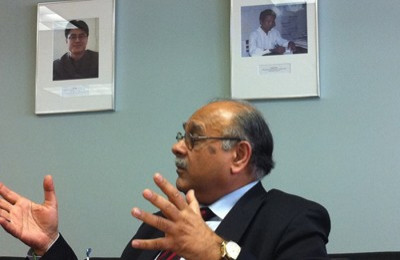Pakistani Journalists Under Threat from Military

At least two prominent broadcast journalists in Pakistan have accused the state security apparatus of threatening them, for questioning and criticizing the role of the military in the nation’s affairs.
Both reporters suspect that the words of warning came from the security establishment and the Inter-Services Intelligence (ISI), Pakistan’s much-feared intelligence agency, which wield enormous power in the country.
One of the journalists, Najam Sethi, a news analyst for Pakistan's Geo TV, told BBC: We did not speak about [these threats] before because we did not want to destabilize things, but the time has come when all of them should come forward and speak about it publicly. This is not the age when the intelligence operatives should be threatening their own civilians. A state within the state is not acceptable.”
Another journalist, Hamid Mir, who hosts a popular talk show on Geo TV, warned other reporters that he has been receiving threats from the security establishment.
I am sure that the security establishment of Pakistan is once again angry with all those who raise questions about the political role of the army,” he wrote in an email released by Committee to Protect Journalists (CPJ).
“If anything bad happens to me or my dear ones, the security establishment will be responsible.
CPJ has cited another Pakistani journalist named Jugnu Mohsin who has been subjected to similar threats.
The threats are not to be taken lightly, given that Pakistan is one of the most dangerous countries on earth for reporters. Earlier this year, a journalist named Saleem Shahzad was tortured and murdered, apparently for writing about links between Pakistan’s Navy and the Al-Qaeda terrorist group. The ISI is widely believed to have been responsible for his slaying, although it has denied the allegations.
According to CPJ, at least 41 reporters have been killed in Pakistan since 1992 – and 29 in just the past five years alone.
The fears over Pakistan’s powerful military-intelligence network were recently addressed by none other than Yousuf Raza Gilani, the Prime Minister of the civilian government. Gilani openly warned that there are elements are conspiring to topple the elected government although he did not point his finger at the military directly.
However, in what is perhaps an unprecedented attack on the military, Gilani said no institution should operate independently and must submit to the rule of law and the parliament.
In a speech in Islamabad, Gilani declared: I want to make it clear today that conspiracies are being hatched here to pack up the elected government. Nobody is above the law, all the institutions are subservient to the parliament. But we will continue to fight for the rights of people of Pakistan whether or not we remain in the government.
Late, on the floor of parliament, the prime minister added: There can't be a state within the state. They have to be answerable to this parliament.
Gilani sarcastically added: “If they [ISI] say that they are not under the ministry of defense, then we should get out of this slavery, then this parliament has no importance, this system has no importance, then you are not sovereign.”
Earlier this year, the former ambassador to the U.S. Husain Haqqani was forced to resign in connection with a memo that he allegedly delivered to military officials in Washington asking their help in reining in the power of Pakistan’s military. That memo has placed great pressure on President Asif Ali Zardari, who reportedly feared he would be removed by the force of a military coup.
© Copyright IBTimes 2024. All rights reserved.





















